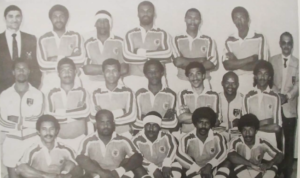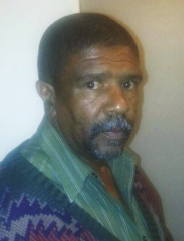In the 12th instalment of a series on black rugby legends, GARY BOSHOFF looks back at the career of former Saru fullback Daniel September.
EARLY LIFE
Daniel ‘Spokie’ September is widely recognised as the best drop-goal specialist and placekicker produced by non-racial rugby. When he was at the peak of his career (1977-1985) he dominated the headlines in non-racial rugby competitions.
September, who was called ‘Spokie’ because he was like a ghost that tormented the opposition, was born in Brackenfell, Cape Town, in 1956 to parents Lilly September and Thomas Davids. Back then, Brackenfell primarily comprised of farmland that was gradually being urbanised due to the expanding Bellville industrial node.
Like so many of his peers, Daniel was born into a culture of rugby, with his father and uncle active rugby players for the local club, Lion Hearts.
‘It was actually my uncle, Joepie September, who had the biggest influence on me choosing rugby instead of soccer as my sport of choice,’ he recalls. ‘He took me to watch Lion Hearts play every Saturday.’
During September’s early childhood he was more enthusiastic about soccer and only started to embrace rugby when he was enrolled at the AME Church School in 1967, aged 11. It was there that he made his first impression as a fullback and was selected for the Western Province U45kg team – the first representative side he played in.
He credits his uncle and club rugby for his initial development.
‘I attended Bellville-South High but was never serious about rugby at school,’ he says. ‘Instead I spent most of my time at Lion Hearts RFC where I felt comfortable and at home.’
In 1972, at the age of 15, he left school to find a job.
RUGBY CAREER
September was eager to continue playing rugby and joined a group of young men from Scottsville to form a new club, Young United RFC. They decided to affiliate with the Waveren Rugby Union, which covered mostly the semi-urban regions of the West Coast and adjacent hinterland.
In their first season, the club won all the trophies on offer and attracted the attention of rugby administrators and coaches. This success inspired September, when he was 19, to seek greener pastures in the senior rugby leagues in Bellville. He was invited to join the Hands & Hearts RFC, which played in the newly established Tygerberg Rugby Union.
The union was affiliated to the non-racial South African Rugby Union (Saru), an affiliate of the South African Council on Sport (Sacos).
September played fullback for the 1st XV from the outset, making an immediate impact.
‘I loved the spirit and enthusiasm at the Hands & Hearts RFC,’ he recalls. ‘I thrived in the visible and vocal support we got from the people of Kraaifontein and Scottsdene. It was very exciting.’
September’s big break came in 1977, when he was selected as a reserve for the famous Tygerberg Rugby Union’s SA Cup side. The incumbent fullback, Ferdie Mackay, was nearing the end of his career and the Spokie September era was about to start.
In 1978, he became the first-choice fullback for Tygerberg and played there until 1984. He played just under 100 provincial games for them. His dominant performances in the SA Cup did not go unnoticed and in 1981 he was selected for the Saru team.

front row of this Tygerberg team photo
September rates the clashes with local rivals Boland as the highlight of his career. He remembers how he was elevated from the bench to the starting XV within the space of a week after some of the spectators complained about his absence from the team.
‘The team manager told me once to be ready for the return match against Boland, because it was clear the supporters had already selected me for it.’
However, a particular match against Western Province Union played at Florida Park (Ravensmead) in 1983, when he scored all the points for the winning side, stands out for him.
‘That game was a street fight, marred by unnecessary robust encounters on the field. Nevertheless, it was also the match where I scored all the points; three drop goals from the halfway line and three penalty kicks,’ he says with pride.
September rates Piet Jooste, the famous Tygerberg and Saru lock forward, and Julian Smith (Tygerberg and Saru captain) as the players he admires most and considers to have been world class. He also mentions local players like Ivan Thomas (lock), Solly Claasen (flank) and Timothy Foster (wing) as some of his favourite players.
LIFE AFTER RUGBY
September’s illustrious career came to an end in 1991, when he was 35. He is very proud of the role he played in South African rugby, particularly as someone who contributed to the eventual liberation of the sport.
After his retirement he immersed himself in his job as an employee of the then Divisional Council, where, because of work commitments, he was unable to stay involved with the game. He would, however, advise individual players on place-kicking technique and how to kick the perfect drop goal.
‘No one taught me how to kick or drop kick a rugby ball; I taught myself,’ he says, adding that his natural ability to kick and control a ball was honed during his early days of playing soccer.
September turned 60 in 2017. He has been a teetotaler his whole life and never married. He reluctantly admits to being a ‘mommy’s boy’ as he still lives with his mother, Lilly, who is 91 and still his biggest fan. Some of his children clearly have the ‘Spokie gene’ in their makeup. The most famous of them is Proteas fast bowler Vernon Philander. September’s daughter Danlee Booysen played netball for the Proteas, while her brother, Jacques Booysen, played for the SA U19 Junior Springboks in the early-2000s.

the City of Cape Town
Today, this icon of Tygerberg and Saru rugby still lives in Scottsdene and works as a senior superintendent for the City of Cape Town. He is active in the local community as a church leader at the Evangelical Fellowship Church of Christ, where he serves as secretary, as well as for the regional chapter of the church.
– This article first appeared in the February 2018 issue of SA Rugby magazine





